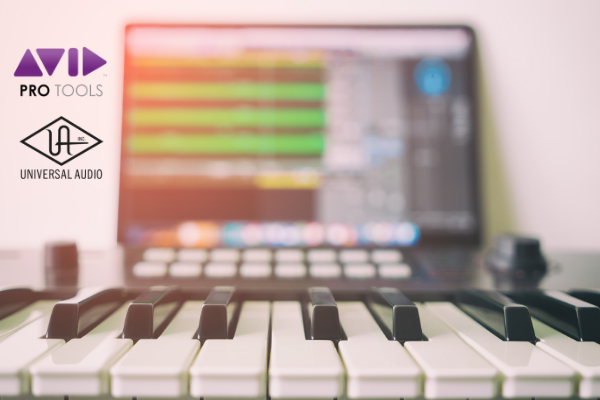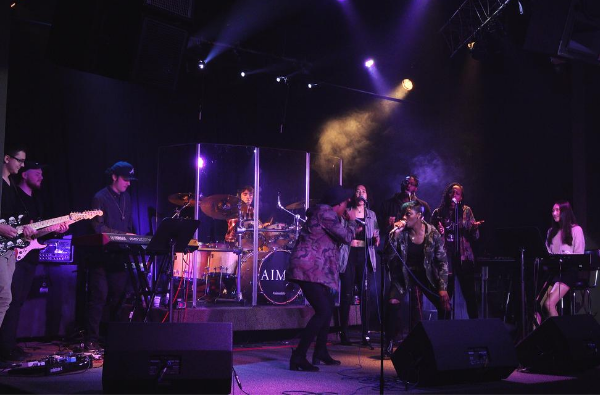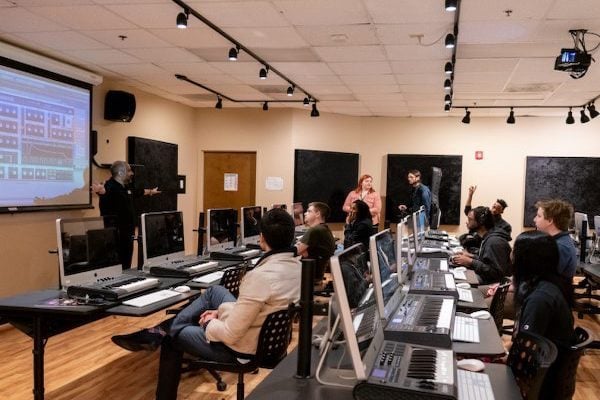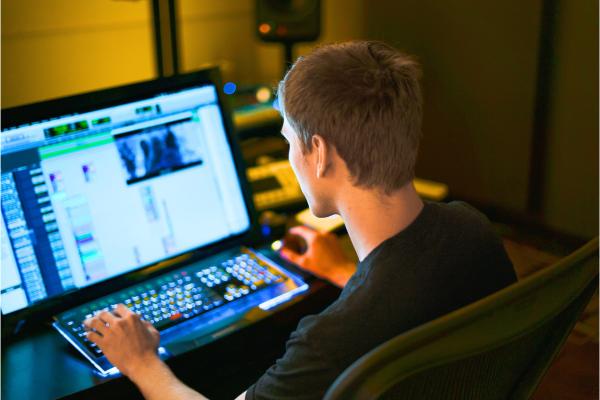
Music Production Degree - Now Offered 100% Online
The ultimate goal of AIMM's online music production program and our Music Production and Audio for Media (MPAM) Online Degree is to empower our students with the comprehensive education needed to elevate their music production and sound engineering abilities. Our new MPAM degree is designed to provide a robust and multifaceted foundation in music production, encompassing various aspects of the industry.
AIMM’s MPAM Online Degree is crafted to help you master the skills essential to become a successful and professional music producer - all online from the comfort of your home. Even as an online student, you'll be immersed in the art of music production, exploring areas such as music production techniques, audio for film and TV, and gaming audio production.
AIMM’s MPAM Online Program educates students in the complete music production process, including the recording processes of tracking, editing, mixing, and mastering for both analog and electronic music production. With an additional focus on AVID Pro Tools Certification and Ableton Live Training, this degree ensures a well-rounded and industry-relevant education.
Why Choose MPAM Online at AIMM?

Fully Online and Asynchronous Format
Experience the freedom of a truly flexible learning environment. Our MPAM Online Degree Program is designed to fit into your schedule, allowing you to study at your own pace from any corner of the globe.
Comprehensive Curriculum
Dive deep into the world of music production with a curriculum that covers a broad spectrum of topics. From mastering music production techniques and audio post-production techniques, to exploring the nuances of gaming sound design, we ensure a well-rounded education.
AVID Pro Tools Certification
Stand out in the competitive music industry with the globally recognized AVID Pro Tools Certification. This prestigious certification enhances your professional credentials and equips you with skills sought after by top studios and producers.
Ableton Live Training
Unleash your creative potential with comprehensive training on Ableton Live. This program bridges the gap between studio production and live stage performance, ensuring you're ready for any musical challenge.
Hands-On Learning Experience
At AIMM, we believe in learning by doing. Our program offers a hands-on, immersive music atmosphere, ensuring every student gains practical experience and skills immediately applicable to real-world scenarios.
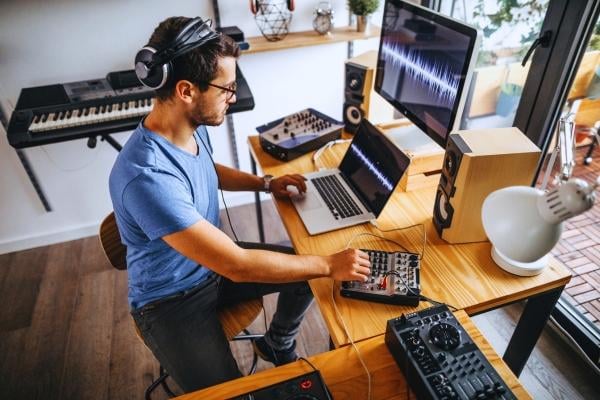
100% Online Music Production Education
Every aspect of our program, from interactive lectures to practical exercises, is conducted online. This ensures a seamless learning experience, allowing you to focus on honing your craft without geographical constraints.
Rigorous and Engaging Course Material
Our curriculum is meticulously designed to be both challenging and engaging. We ensure that our students are well-prepared for the industry and remain passionate and motivated throughout their educational journey.
Affordable Education
Quality education shouldn't break the bank. Our program is competitively priced, ensuring that students receive a top-notch education without the hefty price tag often associated with other institutions.
Career Assistance and Networking
Graduating from AIMM means joining a vast network of industry professionals. Our alumni have access to invaluable career opportunities, mentorships, and connections that can propel them to new heights in their careers.
Transferable Credits
The transition is smooth for those who have embarked on their educational journey with AIMM. Students who have completed the Certificate in Music Production can effortlessly transfer their credits towards the MPAM Online Associate Degree, ensuring continuity in their learning.
Click here to view our E-Brochure.
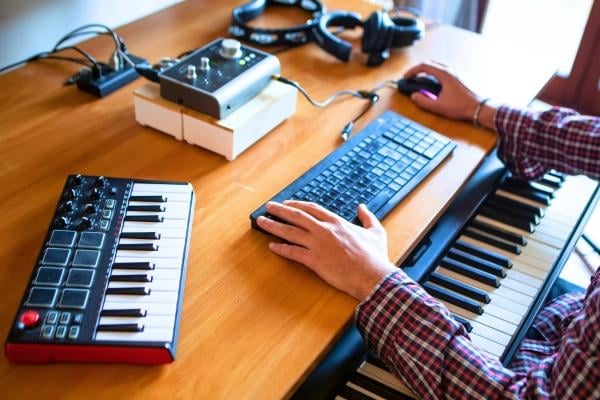
How Long Will It Take To Earn An Online MPAM Degree?
The MPAM Online Degree Program can be completed in 18 months of full-time enrollment or 24 months of part-time enrollment.
This online degree offers unparalleled flexibility, making it the top choice for many aspiring professional music producers.
What Career Opportunities Await After Completing The MPAM Online Degree?
Upon graduation, students are primed to embark on a successful career in the world of music production. Armed with the skills and knowledge acquired at AIMM, graduates can pursue roles as music producers and sound engineers and even venture into specialized areas like sound design for film and gaming.
The music industry highly values professionals with a deep understanding of the music production process and proficiency in using industry-standard music production software. With AIMM, the sky's the limit, especially given the flexibility and comprehensive nature of our online degree.
If music is your passion and you're committed to achieving excellence in your craft, why not position yourself for unparalleled success in the music industry?
Click below to delve deeper into AIMM and discover how our MPAM Online Degree can propel your music production career to new heights.
Embark on Your Music Production Journey with AIMM
At the Atlanta Institute Of Music and Media, we're committed to providing our students with a comprehensive and state-of-the-art education. The MPAM Online Degree Program is a testament to our dedication to excellence, offering a platform for aspiring music producers to shine.
Click below to enroll today and transform your passion for music into a thriving career!
Associate of Applied Science in Music Production and Audio for Media
Music Production Technical Courses
Core Courses — Students Must Complete 53 Credits
| Course Number | Course Title | Credits |
| RCD100 | Pro Tools 101 * | 2 |
| RCD101 |
Critical Listening Skills *
|
1 |
| RCD110 |
Basic Keyboarding Skills *
|
2 |
| RCD120 |
Music Theory Basics *
|
2 |
| RCD130 |
MIDI: Synthesis and Sequencing *
|
4 |
| RCD140 |
Introduction to Audio Production I *
|
3 |
| RCD150 | Skills Lab * | 1 |
| RCD200 | Pro Tools 110 * | 2 |
| RCD205 |
Studio Interconnect Basics *
|
2 |
| RCD220 |
Studio Acoustics Basics *
|
1 |
| RCD231 |
MIDI: Sampling & Composition *
|
2 |
| RCD240 |
Introduction to Audio Production II *
|
3 |
| RCD255 |
Applied Computing Basics *
|
2 |
| RCD300 | Pro Tools 201 | 2 |
| RCD320 |
Electronic Music Production
|
4 |
| RCD330 |
DAW Editing and Processing *
|
2 |
| RCD340 |
Introduction to Music Production
|
4 |
| RCD410 |
Science & Art of Mastering
|
1 |
| RCD430 | Music Business * | 1 |
| RCD460 |
Introduction to Audio Post Production
|
4 |
| RCD360 |
Sound Design for Game Audio
|
3 |
| RCD401 |
Audio Post-Production Techniques
|
2 |
| RCD 500 | Location Sound I | 3 |
| Total | 53 | |
Elective Courses — Students Choose 15 Out of 35 Credits
| Course Number | Course Title | Credits |
| RCD470 | ADR and Foley In this course students work on recording and performance of both Foley and Automated Dialogue Replacement (ADR), emulating the professional skills having to do with microphone technique, proper dialogue recording for post; both single ADR and group ADR; and recording and performing Foley. Props, surfaces and performance techniques are emphasized. Prerequisites: RCD100-300 Pro Tools 101, 110, 201 |
2 |
| RCD510 | Sound Design for Film Audio In this course students will gain a deeper understanding and awareness of Sound Design methods used in modern day films and entertainment. Techniques in sound synthesis, editing, creating, and mixing will be explored and analyzed as well as critical listening and basic understanding of the history of sound design in film. |
3 |
| RCD530 | Portfolio and Web Media* In this course students will gain the knowledge necessary to market themselves in the ever changing audio industry. This course will help students connect their academic work and studio experiences to a digital environment where they can present themselves to employers in a professional manner. The students will analyze and create business card templates, digital showreel demos for online platforms, and deliver an electronic portfolio for completion of the program. Prerequisite: RCD130 MIDI: Synthesis and Sequencing |
3 |
| RCD520 | Location Sound II In this course students will use the knowledge gained from the Location Sound I course to record location audio for both mock and real production sound situations. The student will record dialog for actual filming scenarios that reflect professional demands and applications. Prerequisites: RCD200 Pro Tools 110; RCD460 Introduction to Audio Post Production; RCD500 Location Sound I |
4 |
| RCD540 | Mixing Audio for Post Production In this course students will gain a deeper understanding of multi-channel setup and techniques for dialogue, sound effects, and music, in relation to monitoring, mixing, and delivery formats for working with film, television, and other forms of visual media. Prerequisites: RCD100-300 Pro Tools 101, 110, 201 |
4 |
| RCD350 | Introduction to Live Sound This course introduces all aspects of live venue sound systems and production, including signal flow for live applications, front of house and monitoring sound systems, speaker set up and rigging, microphone techniques for live applications, mixer routing and controls, proper power requirements and set up, room EQ, and communication with artists/musicians. The class is comprised of a one-hour lecture paired with a one-hour lab where students will practically apply the skills covered in lecture. |
2 |
| RCD444 | Advanced Music Production In this comprehensive, hands-on course, students utilize any & all subject matter from previous courses while introducing advanced music production techniques and approaches such as multi-microphone drum tracking to guitar reamping, compositing, editing, and mixing. The student will create and deliver an original music production, from initial composition to tracking all necessary instruments utilizing engineering techniques and a final product delivery, evolving the setup of a DAW session to meet the needs of a professional music production scenario. The product generated in this course can be used in the student’s audio portfolio to aid in securing job opportunities in the industry. Prerequisites: RCD140-340 Introduction to Audio Production I-II; Introduction to Music Production: |
6 |
| RCD400 | Pro Tools 210M This course covers specific techniques for working with advanced professional Avid Pro Tools systems in a music production environment. The main topics in this course are followed by exercises that allow the student to practice concepts taught in class. Included with the course textbook are media files for Pro Tools 210M exercises and hands-on projects. Students in good standing will have the opportunity to take the Avid Pro Tools 210M Operator Certification exam upon course completion. Prerequisites: RCD100-300: Pro Tools 101, 110, 201 |
2 |
| RCD435 | Methods of Mixing This course covers the history, psychology, and mechanics of mixing including topics such as balance and arrangement of the mix, use of stereo field, equalization, effects and dynamics, monitoring, printing various common versions of the mix, and digital mixing with plugins. Prerequisite: RCD200 Pro Tools 110 |
5 |
| RCD550 | Media Composer Fundamentals I | 2 |
| RCD560 | Media Composer Fundamentals II |
2 |
| Total | 35 | |
| Minimum Number of Elective Credits Required | 15 | |
Required General Education Courses — Students Must Complete 24 Credits
| Course Number | Course Title | Credits |
| HUM110 | Creative Writing* This course covers different kinds of writing across multiple genres, including—but not limited to—poetry, fiction, nonfiction and hybrid forms. Students will be encouraged to experiment with these forms of writing, to step out of their comfort zone and challenge their own preconceptions of where writing can take them. The great Russian writer Anton Chekhov once said, “don’t tell me the moon is shining; show me the glint of light on broken glass.” In essence, Chekhov is illustrating one of the most important principles of creative writing: the act of describing through imagery rather than simply “telling.” This course will take Chekhov’s dictum to heart by practicing reading and writing in each genre with an eye towards drafting, writing, and revising original compositions. |
3 |
| HUM115 | English Composition* This class introduces students to the fundamentals of writing. Students will study standard English grammatical and syntactical conventions to ground our composition skills in the systems and structures that will make our writing legible to a general audience of standard English readers. Students also practice brainstorming, drafting, and revising in order to learn about the writing process, identify what works for us individually, and work towards making our processes more productive. Students will regularly apply what we have learned to different formal and informal genres to understand the transferability of standard English writing conventions and the praxis of writing texts across varying styles, forms, and purposes. |
3 |
| HUM120 | Music Appreciation* |
3 |
| MAT110 | Accounting* This course teaches the fundamental accounting and tax information needed to create a successful sound career in the music industry and digital media industries. It will include basic accounting and tax elements, information on setting up a business, selecting the appropriate type of business entity, and accounting aspects as related to various music and intellectual property transactions. |
3 |
| MAT120 | Mathematical Modeling* This course covers applied algebra, linear, piecewise, exponential and quadratic functions. It focuses on logical problem-solving techniques required for critical thinking. Statistical analysis and probability will be used to analyze and explore real world data. In addition, students will develop a clear understanding of the role and function of quantitative analysis. This unit also focuses on skills needed to ensure students acquire better decision-making processes for money management in their personal and business lives. |
3 |
| SCI110 | Principles of Electronics* |
3 |
| SCI120 | Physics of Sound* This course introduces students to the physical nature of music and sound. Waves, sound propagation, harmonic content, the human hearing mechanism and musical instrument tone production are discussed. Psychoacoustics and perception of sound are included. |
3 |
| SOC110 | Cultural Anthropology* Anthropologists take a broad approach to study and understand different aspects of the human experience. This course explores how people in different places live, use music, and interact with the world around them. Students will analyze select case studies from around the world. They will study the perspectives, practices, and social organization of other groups whose values and lifeways may be very different from their own.The knowledge they gain will enrich human understanding on a broader level. Special importance will be placed on global music styles that impact contemporary music including Indian classical music, West African Music, Brazilian Samba, Cuban music styles, and African-American folk music. |
3 |
| Total | 24 | |
| Program Total | 92 | |
Additional Music Program Options
Program Features
- Courses 38
- Credit Hours 92 hours
- Skill level Intermediate
- Language English
- Currently Enrolling Yes

